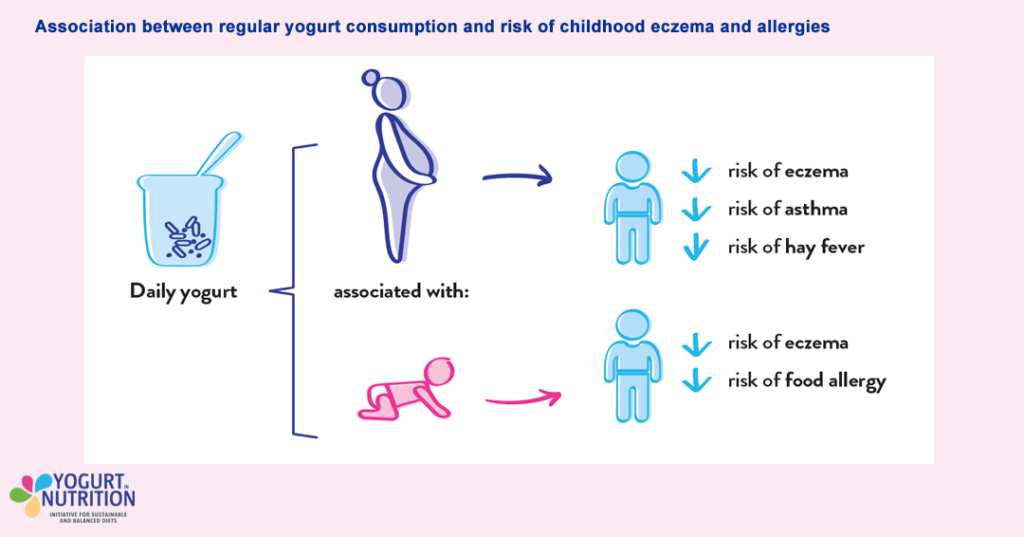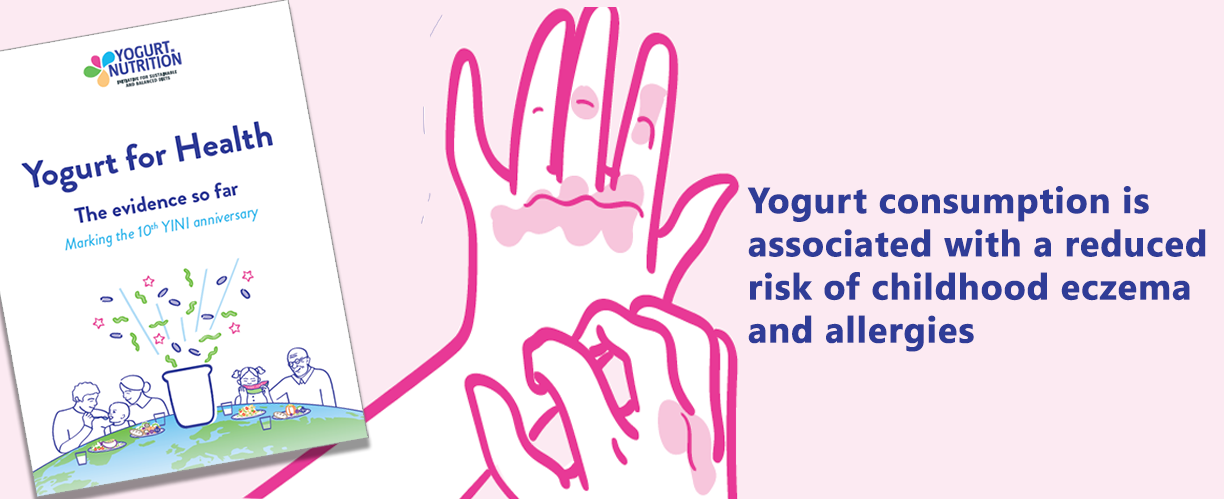Eating yogurt during pregnancy or infancy is associated with changes to the immune system that may help protect against childhood eczema and food or respiratory allergies.
Infants whose mothers eat yogurt during pregnancy have a reduced risk of eczema and respiratory allergies
Eating yogurt frequently during pregnancy is associated with a reduced risk of offspring developing eczema and respiratory allergies during infancy, according to evidence from observational studies:
A study from Japan showed that infants had a reduced risk of eczema and asthma at the age of 2 years if their mothers consumed dairy products including milk, yogurt, and cheese, during pregnancy.
In a Turkish study, eating yogurt daily during pregnancy was associated with a 78% lower risk of infants developing eczema by the age of 2 years, compared with eating yogurt less frequently.
In the USA, a study showed that eating yogurt daily during pregnancy was associated with a lower risk of infants developing eczema, asthma, or hay fever by the age of 4 years, compared with eating yogurt less frequently.

Infants who regularly eat yogurt have a reduced risk of childhood eczema and food allergies
Introducing yogurt to infants during their first year of life is associated with a reduced risk of developing eczema and food allergies later in life, according to evidence from observational studies:
In a Japanese study, eating yogurt before the age of 12 months was associated with a 30% lower risk of developing eczema and a 47% lower risk of developing food sensitivity by the age of 5 years, compared with eating no yogurt.
In a European study, introducing yogurt before the age of 12 months was associated with a 59% lower risk of developing eczema by the age of 4 years, compared with no introduction.
A further New Zealand study involved infants predisposed to allergy as their parents had a history of allergy. It found that introducing yogurt in the first year of life was associated with significant reductions in eczema and food allergy at 12 months old.
The risk of developing eczema and food allergies also appears to be associated with frequency of yogurt consumption during infancy.
In one study, infants who ate yogurt daily had a lower risk of developing both eczema and food sensitivity than those who ate yogurt less frequently.
In another study, infants who ate yogurt daily or 2–6 times a week were significantly less likely to develop eczema than those who ate yogurt less than once a month.
The possible allergy-protective effects of yogurt may be due to the strains of bacteria it contains
A comparison of foods introduced in the first year of life found the protective effect against developing eczema associated with yogurt was greater than that associated with other dairy products.
A series of randomised controlled trials showed that a Lactobacillus rhamnosus probiotic supplement, given daily to infants from birth for 2 years, was associated with protection against eczema and food allergy assessed up to 11 years old.
Another interventional study found that eating yogurt containing added Lactococcus lactis probiotic strains daily for 8 weeks reduced the severity of existing eczema in children aged 2–15 years.
A large observational study found that consumption of milk containing added Lactobacillus and Bifidobacterium probiotic strains by mothers during pregnancy and their infants was associated with a reduced risk of eczema at 18 months of age.
Protection against allergies may be achieved through the gut microbiota
Experts suggest that consumption of fermented dairy products during pregnancy or early infancy may protect against allergies in early childhood by increasing infant gut microbiome diversity and function; this helps to supress allergic responses.
Maternal diet may affect the infant microbiome and allergy outcomes either directly or indirectly via the maternal microbiome.
Research has reported that higher yogurt intake can increase the diversity of the gut microbiome in children and adults, and this can influence the development of the immune system to protect against allerigies.
““Growing evidence suggests that infants who regularly eat yogurt, or whose mothers frequently ate yogurt while pregnant, have a reduced risk of developing childhood eczema and allergies. This may be due in part to the allergy-protective effects of the bacteria commonly found in fermented dairy foods.” “



